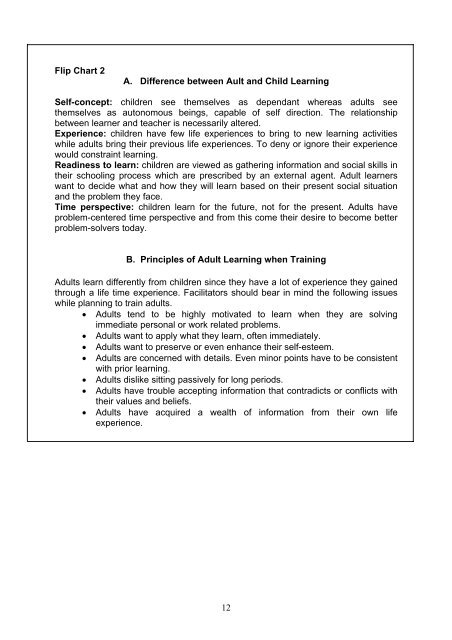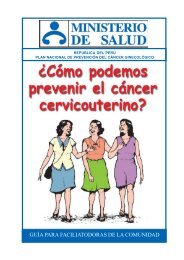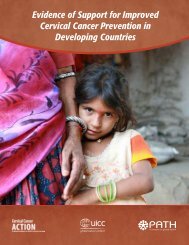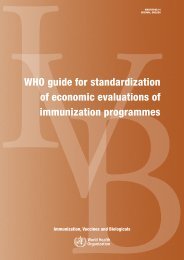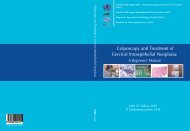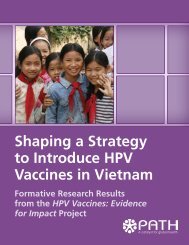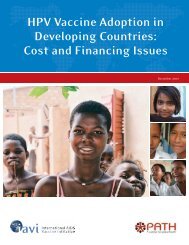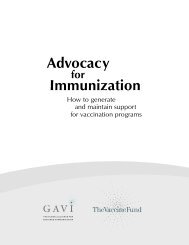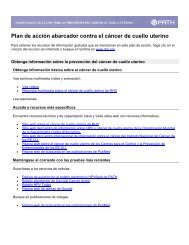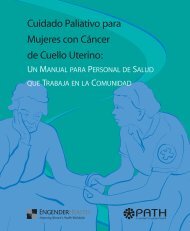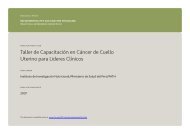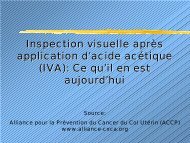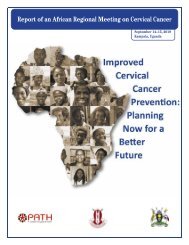Refresher Training for Frontline Health Workers in Expanded ... - RHO
Refresher Training for Frontline Health Workers in Expanded ... - RHO
Refresher Training for Frontline Health Workers in Expanded ... - RHO
You also want an ePaper? Increase the reach of your titles
YUMPU automatically turns print PDFs into web optimized ePapers that Google loves.
Flip Chart 2<br />
A. Difference between Ault and Child Learn<strong>in</strong>g<br />
Self-concept: children see themselves as dependant whereas adults see<br />
themselves as autonomous be<strong>in</strong>gs, capable of self direction. The relationship<br />
between learner and teacher is necessarily altered.<br />
Experience: children have few life experiences to br<strong>in</strong>g to new learn<strong>in</strong>g activities<br />
while adults br<strong>in</strong>g their previous life experiences. To deny or ignore their experience<br />
would constra<strong>in</strong>t learn<strong>in</strong>g.<br />
Read<strong>in</strong>ess to learn: children are viewed as gather<strong>in</strong>g <strong>in</strong><strong>for</strong>mation and social skills <strong>in</strong><br />
their school<strong>in</strong>g process which are prescribed by an external agent. Adult learners<br />
want to decide what and how they will learn based on their present social situation<br />
and the problem they face.<br />
Time perspective: children learn <strong>for</strong> the future, not <strong>for</strong> the present. Adults have<br />
problem-centered time perspective and from this come their desire to become better<br />
problem-solvers today.<br />
B. Pr<strong>in</strong>ciples of Adult Learn<strong>in</strong>g when <strong>Tra<strong>in</strong><strong>in</strong>g</strong><br />
Adults learn differently from children s<strong>in</strong>ce they have a lot of experience they ga<strong>in</strong>ed<br />
through a life time experience. Facilitators should bear <strong>in</strong> m<strong>in</strong>d the follow<strong>in</strong>g issues<br />
while plann<strong>in</strong>g to tra<strong>in</strong> adults.<br />
• Adults tend to be highly motivated to learn when they are solv<strong>in</strong>g<br />
immediate personal or work related problems.<br />
• Adults want to apply what they learn, often immediately.<br />
• Adults want to preserve or even enhance their self-esteem.<br />
• Adults are concerned with details. Even m<strong>in</strong>or po<strong>in</strong>ts have to be consistent<br />
with prior learn<strong>in</strong>g.<br />
• Adults dislike sitt<strong>in</strong>g passively <strong>for</strong> long periods.<br />
• Adults have trouble accept<strong>in</strong>g <strong>in</strong><strong>for</strong>mation that contradicts or conflicts with<br />
their values and beliefs.<br />
• Adults have acquired a wealth of <strong>in</strong><strong>for</strong>mation from their own life<br />
experience.<br />
12


